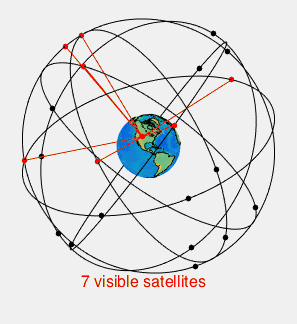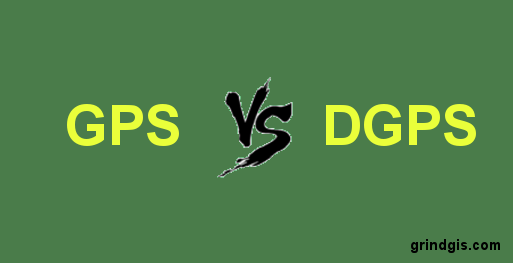GPS: GPS known as Global Positioning System is a collection of number of satellites in the space sending the precise location details in the space back to Earth. Signals are obtained by the GPS instrument which uses to calculate it’s location, speed, time at the location, height of the location and other info. It is very popular in the military world and was first developed by the USA military during the Cold war period. After early 1980 GPS technology is available to the public. Before the military use, 1960 was the year when GPS was first used for ship navigation by USA navy.

Image: Animation showing 24 satellites revolving around earth and total satellites visible to hand held GPS, source: Wikipedia
DGPS: Differential Global Positioning System (DGPS) is an enhancement to the GPS (Global Position System). GPS system based on the satellite technology can have the nominal accuracy of 15 meter whereas DPGS can bring accuracy around 10 cm. DGPS uses the fixed ground based reference stations to broadcast the difference between the coordinates from the GPS and from the fixed position from the base station. The digital correction signal is transmitted to all ground based transmitters called rovers. DGPS rely on two stations one is base station and next is rover.
Image: How Differential GPS works
ALSO READ: WGS84 Vs NAD83
Difference Between GPS and DGPS:
1. In GPS world, handheld device receive signal from the satellite for the position where as in DGPS world hand held device (rover) receives calibrated signal from the ground based transmitter.
2. GPS accuracy is around 15 meters whereas DGPS is around 10 cm.
3. GPS instrument can be used globally where as DGPS are meant locally may be within 100km. DGPS accuracy will start to degrade once instrument distance from ground based transmitters start to increase. Best results by the United States Department of Transportation was 0.67 m error growth within 100 km.
4. GPS system is affordable compare to DGPS system which is why all smart phones have built-in GPS system.
5. In GPS satellite transmit signal in frequency ranging from 1.1 to 1.5 GHz. In DGPS frequency varies by agencies, here is the list of frequency used by different agency.
6. GPS accuracy is highly depend upon the number of satellites used for the calculation, for example there will be better accuracy on open space compare to the forested area, read this. DGPS accuracy is not affected by these variables, it might be affected by the distance between transmitters and the instrument (rover).
7. Most of the time coordinate system used in GPS will be WGS84 in Longitude and Latitude format where as DGPS might have local coordinate system.
Few Resources that Discuss about the Difference Between DGPS and GPS:
1. Differential GPS Comparison Survey: A detail Comparison Differential Corrected GPS Technology, Read Here
2. Accuracy comparison between GPS and DGPS: A field study at METU campus, Read Here
3. A Comparison of Accuracy Using a GPS and a Low-Cost DGPS, Read Here
4. Spatially-variable fertilizer and pesticide application with GPS and DGPS, Read Here
5. An insight on Canadian DGPS use on the Coastal Region: Read Here
6. A pdf file that list frequency ranges used by DGPS all over the world: Read Here





Buford Teves
22 Sep 2017*This really answered my problem, thank you!
Devin Smith
2 Apr 2020Thanx for sharing such an informative blog .If you want to know how ro update garmin GPS then visit the home page.
Garmin Gps Update
16 Dec 2020My travel life has been easier with Garmin Express. Plus I can get all the latest update through their blogs. I use the Garmin app and is totally upto the mark. I recommend everyone to use Garmin Gps Update and get Garmin life time map update and make your life easier with Garmin Map Update for instant help from Garmin GPS experts.
https://www.garmingpsmapupdate.com/
Surveyors Auckland
23 Feb 2021Hi, thank you for such a brilliant post. I have been reading some blogs that gives me more knowledge about difference between gps and dgps. I must say this is one of the best among them. You have done a great research for I feel, thanks for sharing.